A Conversation With Barry Hoffman
by Claire E. White
Award-winning novelist, teacher and publisher Barry Hoffman was born January 30, 1947 in New York City. He was brought up in New York and Long Island
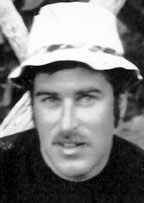
|
His first attempts at writing were plays for adolescents in the late 1980s. The plays dealt with realistic situations as regards teens, such as loneliness, graffiti, and the plight of the homeless. Hoffman wrote the plays, his students wrote lyrics for songs and Hoffman secured the talents of a songwriter and choreographer for each play. Hoffman directed the plays, as well as acting as producer and publicist. The last play dealt with teen runaways, and (for the first time) was heavily edited by the school's principal. "It was too realistic," Hoffman, now says. "Then, again, all my plays dealt with real-life experiences of my students." Hoffman was not invited to write another play, although "Scream From The Heart" was critically acclaimed and received recognition from the Board of Education and City Council.
Deeply disappointed with the censorship he had faced, and having been an author of published short stories for some time, Hoffman turned his attention to publishing and editing a small press publication. "It was something I'd wanted to do, only better than many of the 'zines I'd read and had my work appear in."
Initially, with a full-time job, he only had time to publish once a year, and having been censored felt that subject would be a wonderful vehicle to vent his anger at how politically correct and overly sensitive society had become.
He was fortunate to find a sympathetic ear in Ray Bradbury, who said he could use his Afterword to Fahrenheit 451 in the premiere issue of Gauntlet magazine (the name suggested by his late-father). With Bradbury aboard, it was relatively easy to assemble an all-star cast for the premiere issue -- Isaac Asimov, Ray Garton, Harlan Ellison and many others.
With the third issue, he decided that half of each issue should focus on a theme -- political correctness, black racism, pornography, prostitution, etc. He's just published his fifteenth issue (now published twice a year). Gauntlet has distribution nationwide, in Canada and the U.K.
In 1994, Hoffman began publishing signed limited editions of books for collectors, such as Robert Bloch's classic, Psycho. "I was shocked that with all the books being published in a signed limited format, that Psycho had never received such treatment. It was a true classic, after all." Working with Bob Bloch was such a wonderful experience that he decided his main niche would be publishing "classics-revisited". "There were so many great books that had never been published as a signed limited."
Gauntlet is now publishing six hardcovers a year and is entering the trade paperback arena with Poppy Z. Brite's Are You Loathsome Tonight (which Gauntlet first published as a signed limited edition). Gauntlet was named Best Small Press publisher by the Horror Writers of America in 1999. Of the award Hoffman says, "I'm particularly proud of this award, because it was not voted upon by members, but chosen by the HWA Board of Trustees, so there could be no politics involved."
He spent the next several years honing his craft by writing short stories that were accepted in magazines and for anthologies and in 1993 tried his hand at a novel again, which became Hungry Eyes, a tense psychological thriller which centers around a cat and mouse game between a serial killer and the reporter who is trying to solve the crime.
"In a short story you can only get so close to the characters. The plot's the thing. With a novel, on the other hand, you can become one with your characters and watch them grow in ways you never imagined. With Hungry Eyes I was hooked and have never turned back."
Hungry Eyes was nominated for a Bram Stoker Award for Best First Novel by the Horror Writers of America and also by the International Horror Guild. Hungry Eyes and the sequel, Eyes of Prey, were both released as Leisure paperbacks. His first stand-alone novel, Born Bad was released by Leisure in November, and the third book in the Eyes series, Judas Eyes, will be published in February 2001. He just completed the 4th Eyes novel. Hoffman has written 3 other stand alone novels, the most recent with his daughter Dara.
Hoffman officially retired from teaching in June, 2000 to devote himself full time to writing and publishing. Hoffman is divorced and the father of three: Dara, 26, David, 23 and Cheryl, 20. He spoke to us about his latest book, Born Bad, how censorship affected his life, and what aspiring writers should know about all that conflicting writing advice that they hear.
I'd like to talk about your latest release, Born Bad. What was your inspiration for this novel?
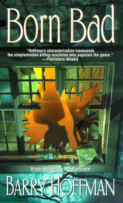
|
Shanicha is a horrifying, yet fascinating character: a crack baby who grew up with absolutely no conscience whatsoever. Yet she definitely feels pain -- a great deal of it. How did you create the character of Shanicha?
I don't view people in terms of black and white, but shades of gray. While initially I wanted Shanicha to be bad to the bone, the character evolved. I also think there has to be some reason given for the lack of remorse a character like Shanicha feels. Crack babies carry all sorts of emotional baggage. It's conceivable a crack baby could be born without a conscience. Yet to fully develop her I made sure she had issues of her own that plagued her. She can feel pain even though she had no conscience and felt no remorse for what she does throughout the book. The reader might even sympathize with Shanicha at times, which I really liked. I mean here's this character who manipulates others to kill and destroy. She's not someone you'd want as your next door neighbor. Yet, because of the pain she feels you feel sorry for her despite yourself, then hate yourself for feeling this way. It puts the reader in a real quandary when he/she puts the book down at the end.
Ariel is another interesting character, who has a lot of complex issues to deal with. What went into your decision to create Ariel as a detective of racially mixed heritage?
Most of my books deal to some extent with socially relevant
| "It's corny to say follow your heart, but I think that's the best advice I can give. Write what you want regardless of what others might have to say. An author must first satisfy themselves. If you write for others I don't think you'll ever be happy." |
I understand that the University of Pennsylvania banned the book from the campus? Tell us about that.
Born Bad is a mystery/thriller/dark suspense novel. Pick your poison, as it's hard to categorize. And, in such a book there might well be a murder. It just so happens that Shanicha was in college and I chose the U. of Penn to be the setting for the book. The university is presented in a positive fashion, by the way. But three freshman coeds apparently commit suicide. I was invited to be part of a book discussion. The events coordinator for the University of Pennsylvania Bookstore read and enjoyed the book. Several days before the event I called him up to ask him for details and he told me I was no longer invited. His superiors decided the nature of the book was too "sensitive," in particular the suicides. That was ridiculous, because Born Bad goes to extremes to describe all the mechanisms at a campus like Penn to identify depression before suicides do occur. Suicides do occur, yet for the same age group there far lower suicides on college campuses than in the general population. This is why one of the campus police officers doesn't think they were suicides -- and in fact they were not (this doesn't give away the plot, by the way). It seems Penn was overly sensitive to suicides occurring on their campus, so I got the boot.
I'd like to talk about your publishing company, Gauntlet Press. What prompted you to start your own press? What was the greatest challenge that you have had to overcome?
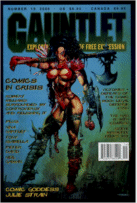 |
Censorship is an issue that is hotter than ever today. What is your opinion of Senator Leiberman's Golden Sewer Awards and of both Vice President Gore's and President-Elect Bush's promises to "clean up Hollywood"? How involved should the U.S. government be in censorship issues where children are concerned?
Hollywood is a convenient scapegoat because it costs no money to
| "I can't think of any instance I've read about where a school was justified in banning a book. If a classic book has racist terms, the teacher (and parents) should discuss this with their children. I personally object to many of the lyrics in rap songs, but I don't think they should be legislated out of existence. I would much rather have my children listen to such songs which I would then discuss with them. In this way you can combat racism, sexism and violence towards women." |
Other than enforcing existing child pornography laws (those that protect children from being sexually exploited by adults) the government should do nothing to protect children. Parents can control what their children watch. Parents can watch programs (or play video games or listen to records) with their children and then discuss what they've seen (or heard) with their children. Not every child deserves to have his/her own television. And if a show is offensive, there's that on/off button. My parents did it with me and I did it with my own children.
The comics industry has certainly faced some major censorship issues. Can you give us an update about these issues and how the comics book industry is responding to censorship?
The biggest problem facing the comics industry is monopolization. Diamond Comics is now the only major comics distributor. They control what gets out into the marketplace. They carried Gauntlet, for instance, until we had an issue dealing with erotic photography of children. They found that offensive and didn't carry us for three issues. Then they changed their mind and are carrying us again. So, to get a comic distributed is large quantities you have to go through Diamond. Their monopoly makes Microsoft look tame. There aren't many censorship issues in comics at this moment because the comics that stirred things up are having problems finding distribution. Diamond has tamed the comics industry. So 2000 has been relatively controversy free in this country.
As a father, do you believe there are any instances when material should be banned because it is too intense or otherwise objectionable for children?
Who determines what is too intense or objectionable? That's the problem. I mean even with Harry Potter there are those who want the book banned because of the witchcraft in the series. Again, I think parents should decide what their children can read (or watch) and when they can read/watch it. My youngest daughter loved the Nightmare on Elm Street movies when she was eight. My son, three years older, was scared by those movies. So she watched them and he didn't. I can't think of any instance I've read about where a school was justified in banning a book. If a classic book has racist terms the teacher (and parents) should discuss this with their children. I personally object to many of the lyrics in rap songs, but I don't think they should be legislated out of existence. I would much rather have my children listen to such songs which I would then discuss with them. In this way you can combat racism, sexism and violence towards women. If you make believe violence towards women doesn't exist children won't be prepared when they face it. Parenting is preparing children for what they'll encounter in life. And if parents know their children they will know when something is too intense for them. I find books that treat women as hapless victims, but never as victimizers nor heroines personally objectionable, but I certainly don't think they should banned. Allow me to ban certain books then you open a Pandora's Box: there's something to offend Everyone, which Ray Bradbury said so eloquently in his afterword to FAHRENHEIT 451.
One of the themes that seems to run through your books is the blurring of the lines between good and evil: your "evil" characters always have some "good" elements. In fact, readers may actually empathize with a serial killer while reading your books? (no easy feat on your part.) Do you think in themes when you write? Is this theme one that holds special interest for you?
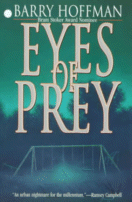
|
I'd like to talk about the day to day details of writing. Do you have a set schedule? A requirement for a certain number of pages to do every day? What kind of surroundings do you have when you write?
Every writer is different. I don't have a set schedule, though I do most of my writing in the evening and early morning (now that I publish and write full-time I go to bed at 3:00 AM and wake up at 10:00 AM.). I might start writing at eleven and write until three. If I'm on a role I don't get to bed until four. Others days I don't write at all, but there's a chapter or structure of a novel percolating in my mind. I'll make notes while I'm driving or play with dialogue in my mind while going for a walk. And I never write a set number of pages. I don't have writer's block, so I don't struggle over any one page. But sometimes I'll write 3 or 4 pages and other days 7, 8 or more pages. It depends on how the chapter(s) is flowing. I've written all of the first drafts of my books in longhand. I began writing before there were word processors and computers and older typewriters were too slow for me. So, I'll write a chapter (or two) leaving out details to be filled in later. The next night I'll reread that chapter and fill in the details. When the book is complete, then I type it up (a form of a rewrite). I write in my room, which is quite cluttered. I can't have music on when I write. It's just me, a pen and writing pad.
Your books are character intensive, with twisting and fast-moving plots and a lean narrative. Is this an intentional approach on your part, to focus less on description than character and plot?
Yes, I consider myself a minimalist. I recall being intrigued by Poe early on. In "The Telltale Heart" he has a man and an old man (and a couple of cops). None have names. The man isn't described. The old man's eye is meticulously described because of its importance to the story, but the old man himself is just an old man. And the cops have no physical description whatsoever. The reader has to imagine what each character looks like that I think that's wonderful. In my books I focus on character and plot. If something is described in detail you know it's going to be important to the plot. But if a person drives a car it's just a car (maybe red or blue). I don't go into detail about what my characters wear or what they eat. That I leave to the imagination of the reader. It allows me to delve into the characters and keep the plot moving. Some writers add details to pad their books. For me, as a reader, it interrupts the flow.
How do you approach the plot of a new book? Do you use outlines? Do you always know the ending when you begin the novel?
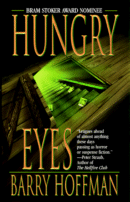
|
Who are some of your favorite authors?
Poe, whom I mentioned and Bradbury were great influences on me. Bradbury probably more than any other. His plots are so wonderful, especially his early short stories. I love much of Stephen King's work because of the characters he creates (he's especially good with children). F. Paul Wilson has these wonderful characters with warts and flaws. Richard Matheson and Bob Bloch spun wonderful tales and were minimalist writers. Donald Westlake is another favorite, especially his early books. They were among the few books that made me laugh out loud. And I love Dick Francis because his books read so well and so many of his characters are just ordinary people. David Morrell writes wonderful thrillers. Dean Koontz blends elements of thrillers with the supernatural. I've done that with some of my books, so he's definitely been an influence. I know I'm forgetting others, but generally, other than Poe my favorite authors are contemporary writers.
Can you give us a sneak peek at your next book?
My next published book is the third book in the Eyes series Judas Eyes. The main character in the series is coming to grips with her life. She's conquered her demons (though they still lurk deep within), but she's aware that while she's in her mid-twenties a good ten years of her life have been lost. So, in a way, she is grasping at life like a teenager. She's finding joy and pain and the delicate balance necessary to lead a full life. And she is after a woman much like herself. In tracking this woman down she actually learns a good deal about herself. This book also has supernatural underpinnings. A mythology introduced in Eyes of Prey is more fully developed that becomes even more important in the 4th book in the series, which I've just completed. As to what I'm writing now, well it's a children's fantasy: or rather a rewriting of a book I wrote almost 30 years ago. The heroine of the book was named Dara and my ex-wife and I named our first child after that character. My Dara is now expecting her first child. Yeah, I'm gonna be a grandpa. She recalled the book and wanted me to send it to her so she could show her child how she got her name. I reread the book, was still entranced by the plot, but boy, was it poorly written. So I'm rewriting it and having a ball. It's a real departure for me, though it does have its dark moments (can't get away from that).
What is your advice to aspiring authors?
Not to take other's suggestions too seriously. There is NO one way to write. I could never get through a book on writing and most classes on writing stifle one's creativity. I think aspiring writers should read a lot, then write short stories. What worked for me was finding other authors who would constructively criticize my work (and I emphasize the word constructive). I had to learn to show rather than tell, cut down the length of my sentences and paragraphs. And, slowly I developed my own voice. But that worked for me. Don't listen to those who say you must have a detailed outline or those who say write with no outline at all. They're both right (and wrong). Don't listen to those who say you must write a certain number of pages a day. Sometimes you can often accomplish far more by just mulling over a chapter than writing. But then again, some people feel they must write a certain number of pages a day, and that's fine, too. It's corny to say follow your heart, but I think that's the best advice I can give. Write what you want regardless of what others might have to say. An author must first satisfy themselves. If you write for others I don't think you'll ever be happy. On the other hand, that just my opinion.
What's on your gift wish list this holiday season?
Seeing my youngest daughter (I've recently seen my son David and Dara). Just having Cheryl with me for a week is all I could wish for. For the post-holidays, in February I look forward to the birth of my first grandchild. Lastly I just hope I continue to enjoy writing as much as I do now. I've written eight books (my children's book is my ninth) and each has provided me with a wonderful journey. I can't see ever losing the joy I get in writing the characters I create and those who surprise me by writing themselves despite myself.
Return to the December-January 2001 issue of The IWJ.
More from Writers Write
